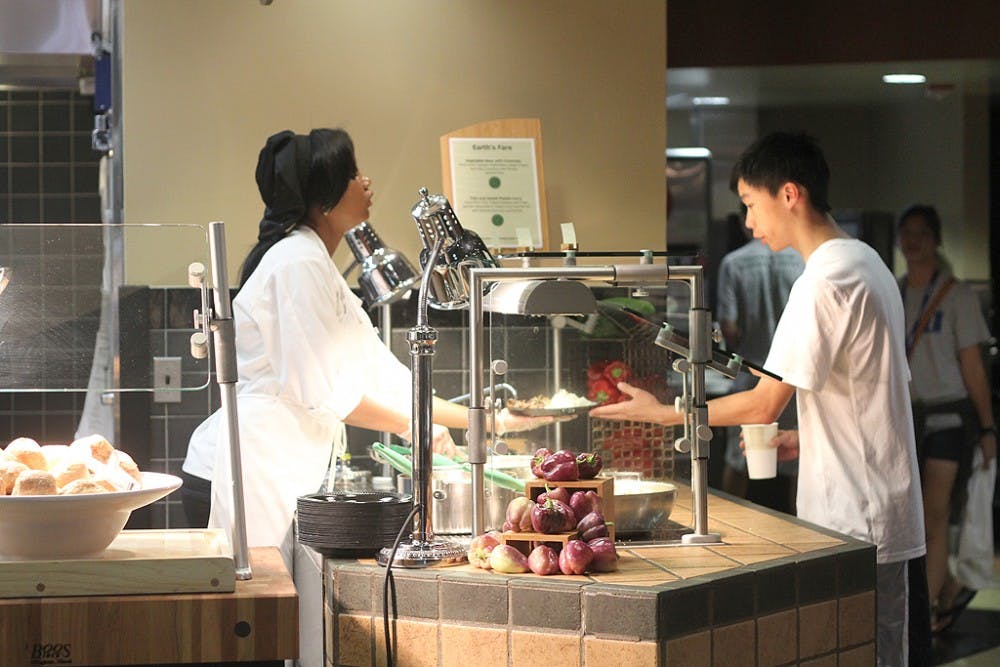Duke’s food management company is preparing to launch an industry-leading comprehensive animal welfare policy.
Starting in 2015, Bon Appetit Management Company, which operates many of Duke’s dining operations as well as the dining services at more than 400 colleges, universities and other organizations, will not buy eggs from hens kept in cramped battery cages or pork produced in gestation crate confinement systems.
The company does not expect prices to increase as a result of the policy announced last month, the first of its kind to be implemented by a major food service provider, Bon Appetit Resident District Manager Nathan Peterson wrote in an email Monday.
“Meat from animals raised in these cruelest of conditions—gestation crates for pregnant sows and battery cages [for] hens—is not sustainable in the long term,” Peterson said. “We have always gotten requests from students to use more humanely raised meat and eggs and have wanted to do so for years.”
The Humane Society of the United States partnered with Bon Appetit in this process and helped them select new suppliers compatible with the decision, Peterson noted.
Average-sized battery cages confine hens to a 67 sq.-inch space, too small to stretch their wings, according to the Humane Society’s website.
The industry standard for pork production includes the use of gestation crates, said Josh Balk, spokesman for the Humane Society’s factory farming campaign. These crates hold pregnant pigs in a space only slightly larger than their own bodies, leaving them unable to turn around. In the several states where gestation crates have been on a ballot referendum, citizens have overwhelmingly voted to ban them, he noted.
“They’re in these crates for four years, which is as long as someone would [study as an undergraduate] at Duke,” Balk said. “The pork industry is completely out of step with how consumers feel pigs should be treated when they defend the cruel and inhumane confinement of gestation crates.”
Bon Appetit will immediately cease the purchase of veal and foie gras—made from fattened goose or duck liver—neither of which are served on Duke’s campus, Peterson added.
Additionally, Bon Appetit committed to purchase 25 percent of its meat and eggs from producers certified as humane by independent animal welfare groups, which will monitor whether farmers allow animals to engage in natural behavior, said Helene York, Bon Appetit’s director of strategic sourcing and research. Bon Appetit will also continue to encourage vegetarian options as part of its ongoing Low Carbon Diet initiative.
In early March, Compass Management, Bon Appetit’s parent company, announced a similar policy that will go into effect in 2017, Peterson noted.
“The large national leaders in the meat industry have been much faster to change in response to pressure from consumers, large buyers like ourselves and the public in the form of ballot initiatives than they have been to changing on their own,” he said.
In 2005, Bon Appetit became the first major food service company to switch the purchase of its shell eggs to cage-free. However, the majority of eggs used in college dining halls are liquid, pre-cracked eggs, Balk said. Under the new policy, all 11 million liquid eggs purchased annually will also be cage-free.
The idea of taking action on humane treatment of farm animals was originally brought to Bon Appetit in 2005 by an American University student, York said. As a result of the student’s efforts, the company committed that year to only purchase cage-free shell eggs, and the company has wanted to expand that cage-free commitment to all its eggs since then, she added.
Spurred by what he learned from the American University student, Bon Appetit CEO Fedele Bauccio served on the Pew Commission on Industrial Farming from 2006 to 2008.
“He was horrified by what he learned about factory farms,” York said.
Since Bon Appetit is a large buyer within the food industry—it purchases 3 million pounds of pork per year—its decision will cause suppliers to either change their production methods or lose business, York noted.
“I hope that other companies in the food industry will follow suit with Bon Appetit,” said senior Alana Bossen, president of Duke for Animals. “If animals are giving us the ultimate sacrifice of their lives, then at least we can spend a little bit more money on humanely raised meat and allow these animals to have a pleasant life while they are alive.”
Get The Chronicle straight to your inbox
Signup for our weekly newsletter. Cancel at any time.

